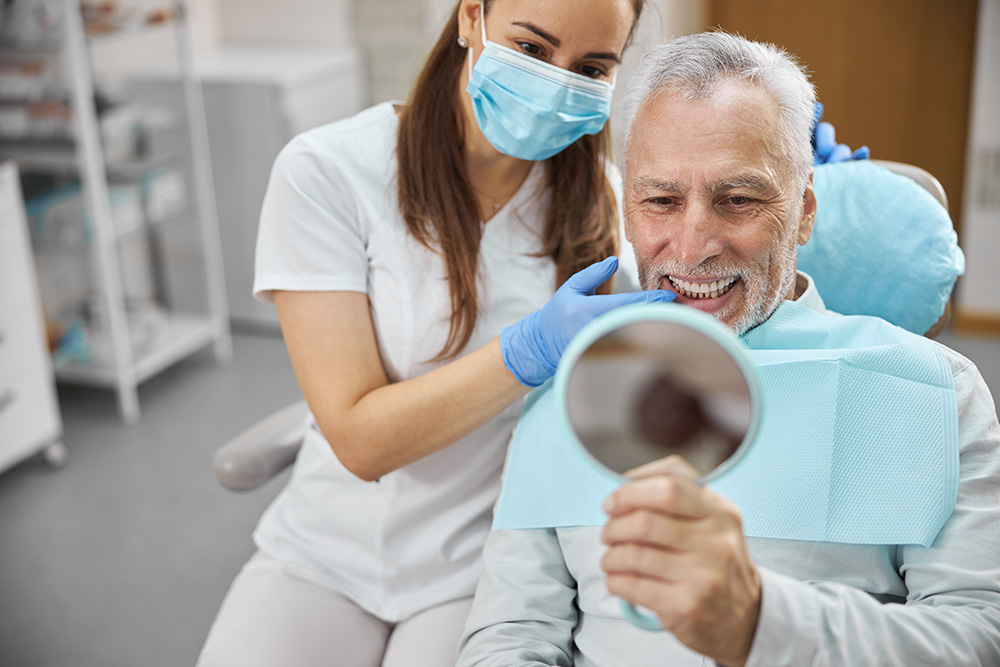Dentures Near You
Dentures can be a wonderful solution if your smile needs to be restored. Their primary purpose is to fill in gaps left by missing teeth.
Don’t let the movies or the countless jokes get to you – dentures aren’t just for seniors because patients can lose their teeth due to several factors, not just aging.
At MC Dental, we’re here to help you with all your oral health goals. To learn more about dentures in LaSalle call our clinic.

Reasons for Missing Teeth
Besides aging, some of the main reasons that patients can be missing teeth are:
- Untreated dental decay
- Gum disease
- Poor nutrition
- Smoking
- Getting orthodontics
- Oral/facial injuries
- Other medical conditions
If any of these things apply to you, talk to a dentist in LaSalle today. They will invite you to come in so they can perform a thorough dental exam, take X-rays, and discuss your oral health to help you achieve all your smile goals with high quality dentures near you.
Get an Effective Dental Care Plan in LaSalle, ON
We’re here to help – give us a call today!
Partial vs Complete Dentures
The two main types of dentures in LaSalle that are available to you are partial and complete dentures. There are benefits to each structure, depending on your situation.
Partial
These are given to patients who still have a few natural teeth remaining. Similar to dental bridges, they remain in place via metal clasps that grip onto the healthy teeth. The gum-colored base is designed from acrylic, while the artificial teeth are usually made from porcelain.
Complete
These dentures are used when a patient is missing all their teeth. Complete dentures are also designed from acrylic and porcelain, providing a natural look. This prosthetic sits atop your gum tissues and stays in place via suction and saliva; a special dental adhesive can be used as well.
Note: It takes a bit of time to get used to wearing your dentures daily, but this transitional phase doesn’t last too long. Your mouth will adjust to the feeling of the device, and you’ll eventually be able to speak and eat without any issues at all.
Just like with a mouth guard, retainer, and even ordinary teeth, dentures need to be properly maintained through daily cleanings, so bacteria and debris don’t build up on their surface. Be sure to store them in a safe, dry place when you’re not wearing them, so they don’t get damaged.
If you have any problems or concerns, talk to a dentist near you right away.
Visit Our Local Dental Practice
If you need dentures to restore your smile, our dentist near Windsor is at your service. Simply call or come into our clinic to select an appointment time.
We look forward to your visit for dentures near you and are excited to be part of your dental journey.
📍Find us easily on Google Map.
Frequently Asked Questions
What type of dentures do I have to choose from?
You can have partial dentures, which fill in the gaps when you still have some healthy teeth and use clasps for support, or complete dentures, which replace the full arch of your teeth and sit on top of the gums, usually held in place through suction or adhesive.
Why do people lose teeth and need dentures?
Teeth will fall out if the situation has progressed to a point where cavities have remained untreated, gum disease, trauma, lack of appropriate nutrition, smoking, or medical conditions are a few reasons. Tooth loss leads to dentures to help you keep your aesthetics as well as to replace your teeth functionally.
How long does it take to get used to wearing dentures?
There is a settling period with new dentures; your mouth may feel funny, but your body will adapt. In general, most people work into their dentures within a few weeks, eating and speaking comfortably as the tissues of their mouth adapt to the new fit and presence of dentures.
How do I care for dentures to keep them in good shape?
Daily cleaning is important: each day, take out your dentures and clean them with a soft brush; store them in a safe place when you are not wearing them; and avoid bacteria buildup. If you notice damage or discomfort, please get in touch with your dentist as soon as possible.
Do dentures affect eating and talking?
In general, dentures near you can impact when you start eating or if while pronouncing certain sounds. However, with the proper adjustments and practice, you will get back to the speech and chewing that you had before. Your dentist will help you understand which techniques can speed up this process.